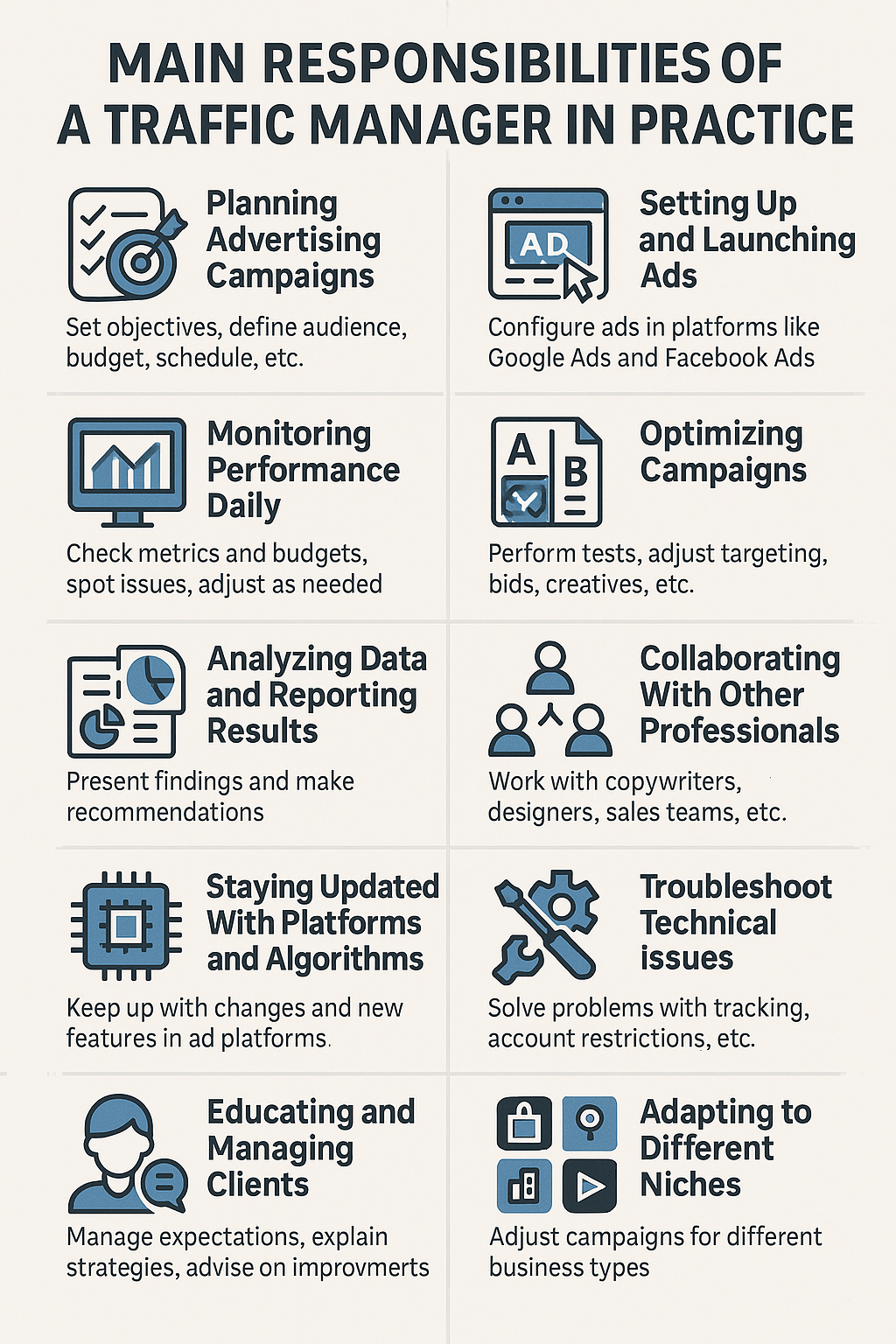The role of a traffic manager goes far beyond simply launching ads. It requires a combination of technical skills, strategic thinking, and a deep understanding of how people interact with brands online. Whether you’re considering this career or hiring one for your business, knowing what a traffic manager actually does is crucial.
Planning Advertising Campaigns
One of the most important responsibilities of a traffic manager is to plan campaigns strategically. This means understanding the client’s business goals, identifying the right audience, selecting the appropriate platforms, and outlining a detailed media plan.
The planning stage often includes:
- Choosing campaign objectives (leads, sales, engagement, etc.)
- Creating audience personas
- Defining budget and schedule
- Selecting key performance indicators (KPIs)
- Planning content and creatives needed for the ads
Without a clear plan, advertising efforts become disorganized and inefficient.
Setting Up and Launching Ads
Once the plan is in place, the traffic manager moves on to execution. This involves logging into ad platforms like Facebook Ads Manager, Google Ads, or TikTok Ads, and configuring the campaign settings.
Some of the tasks during ad setup include:
- Installing tracking tools (like Facebook Pixel or Google Tag Manager)
- Creating custom audiences and lookalikes
- Uploading creatives (images, videos, copy)
- Defining bidding strategies and placements
- Connecting the ads to landing pages or funnels
Accuracy during setup is vital. A small mistake can lead to wasted budget or incorrect tracking.
Monitoring Performance Daily
A skilled traffic manager doesn’t just launch and forget. Daily monitoring is part of the job, especially in the early days of a campaign.
Performance monitoring includes:
- Checking if ads are approved and running correctly
- Watching for unusual spikes in spend or drops in performance
- Analyzing metrics like CTR (click-through rate), CPC (cost per click), CPA (cost per acquisition), and ROAS (return on ad spend)
- Ensuring the budget is being spent as planned
This real-time control helps avoid serious issues and allows for quick adjustments.
Optimizing Campaigns
Campaign optimization is where a traffic manager proves their value. No campaign is perfect from day one, so continuous improvement is necessary.
Common optimization tasks include:
- A/B testing different ad creatives and copy
- Changing audience targeting based on performance
- Adjusting bids or budget distribution
- Pausing underperforming ads
- Testing new placements or formats (carousel, video, etc.)
Effective optimization can cut ad costs dramatically while increasing results like leads or sales.
Analyzing Data and Reporting Results
Another essential part of the traffic manager’s work is data analysis. They must interpret the numbers and translate them into useful insights for the client or team.
This includes:
- Creating visual reports (weekly or monthly)
- Explaining what worked, what didn’t, and why
- Offering recommendations for future campaigns
- Showing the business value of the investment
Good traffic managers know how to present complex data in a way that non-technical clients can understand.
Collaborating With Other Professionals
While the traffic manager controls the ads, their success often depends on working with others. For example:
- Copywriters create the text for ads
- Designers produce the visuals and videos
- Funnel builders develop landing pages
- Sales teams follow up with leads
Being a good communicator and team player is critical. The traffic manager must give feedback, request materials, and align strategies across departments.
Staying Updated With Platforms and Algorithms
Advertising platforms like Meta and Google are constantly changing. A big part of a traffic manager’s routine is keeping up with updates to avoid falling behind.
This might include:
- Following official blogs or newsletters
- Participating in courses and certifications
- Joining forums or groups in the advertising community
- Testing new features before competitors do
What works today may not work tomorrow, so adaptability is a must.
Troubleshooting Technical Issues
Sometimes things go wrong—pixels stop tracking, ads get disapproved, or an account gets restricted. A traffic manager needs to have problem-solving skills to:
- Understand error messages or disapprovals
- Communicate with platform support if needed
- Adjust campaigns to meet ad policies
- Reinstall or reconfigure tracking codes
Technical know-how helps minimize downtime and keep campaigns running smoothly.
Educating and Managing Clients
Especially when working with small businesses or entrepreneurs, a traffic manager often plays an educational role. Clients may not fully understand digital marketing, so it’s important to manage expectations and provide guidance.
This includes:
- Explaining how long results typically take
- Helping the client set realistic goals
- Clarifying industry terms and metrics
- Recommending improvements on their website or sales process
The goal is to create a healthy, transparent partnership.
Adapting to Different Niches
Each business niche behaves differently. A traffic manager must adjust strategies depending on the market:
- E-commerce campaigns may require dynamic product ads
- Local service businesses need geotargeted campaigns
- B2B clients often need lead generation forms and email nurturing
- Infoproducts usually work best with launches or evergreen funnels
The more niches a traffic manager understands, the more versatile and in-demand they become.
Managing Budgets Responsibly
Traffic managers are often trusted with thousands of dollars in ad spend. It’s their responsibility to ensure that every dollar is used wisely.
This includes:
- Avoiding ad fatigue (showing the same ad too often)
- Managing daily, weekly, or monthly budgets
- Avoiding overspend through proper campaign settings
- Reallocating funds based on performance
Good budget management builds trust and proves the value of traffic management services.
The Bottom Line: A Strategic Role With Big Impact
Being a traffic manager is more than pushing buttons on ad platforms. It’s a strategic role that combines creativity, analysis, communication, and a deep understanding of digital behavior.
In practice, the traffic manager:
- Plans and launches campaigns
- Monitors and optimizes performance
- Analyzes data and reports results
- Works with multiple teams
- Keeps up with industry changes
If done well, this work can dramatically increase a business’s revenue—and create long-term opportunities for the manager.

